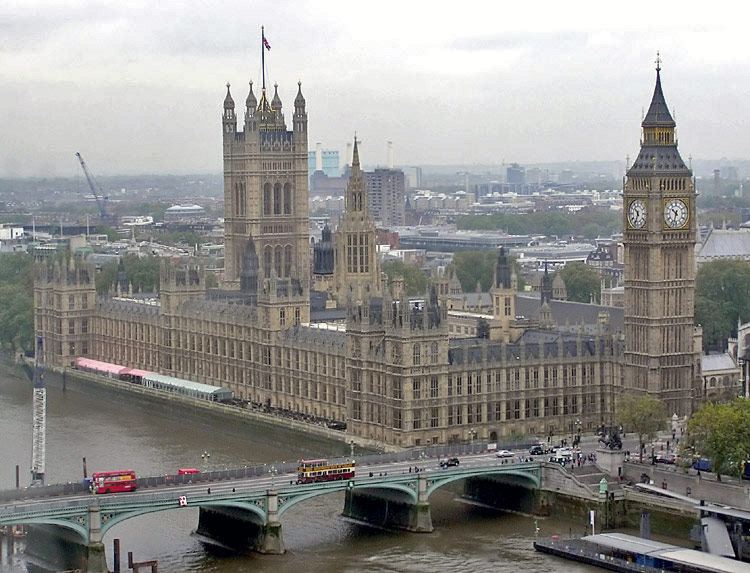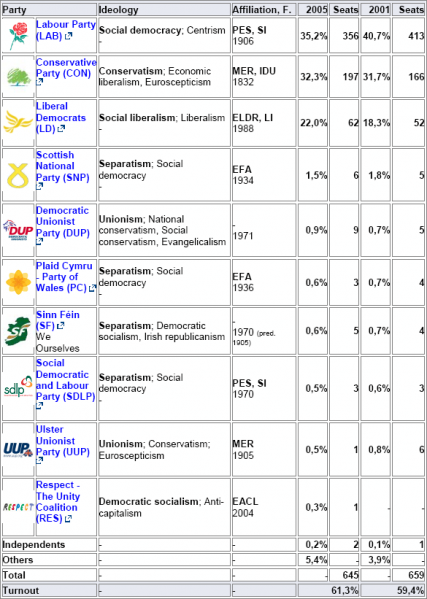The main British parties support a strong transatlantic link, but have become increasingly absorbed by European issues as Britain’s economic and political ties to the continent grew in the post-Cold War world. Prime Minister Brown is expected to continue Blair’s policy of having the United Kingdom play a leading role in Europe even as the United Kingdom maintains its strong bilateral relationship with the United States. Britain’s relationship with Europe is a subject of considerable political discussion in the United Kingdom.
The United Kingdom is a constitutional monarchy and parliamentary democracy, where Queen Elizabeth II is recognized as the head of state, and where the leader of the majority party, the Prime Minister, currently Gordon Brown, is the head government.

| House of Parliament - source |
Parliament is made up of 3 elements: The Queen, the House of Commons and the House of Lords. They meet together only on occasions of symbolic significance such as the State Opening of Parliament, when the Commons are summoned by the Queen to the House of Lords
- The House of Commons is the lower house of the Parliament. It’s a democratically elected body consisting of 646 members called Members of Parliament (MPs). Each member is elected by and represents an electoral district of Britain known as a constituency. The Prime Minister is an MP, and part of the House of Commons. The House of Commons is where the MPs meet to debate Bills and issues affecting the country
- The House of Lords is the upper house of the Parliament, and here members called ’Lords’ meet to debate, change Bills and scrutinise the work of the Government. Members of the House of Lords aren’t elected; they either inherit their title or are appointed by the Government or shadow cabinet. The members consist of 2 archbishops and 24 bishops of the Church of England ("Lords Spiritual") and 692 members of the Peerage ("Lords Temporal"). At the moment, the members of the 731 seat House of Lords currently outnumber the members of the 646 seat House of Commons. Both the House of Lords and the House of Commons are situated in the Houses of Parliament in London’s Westminster.
The main functions of Parliament are:
- to pass laws;
- to provide, by voting for taxation, the means of carrying on the work of government;
- to scrutinise government policy and administration, including proposals for expenditure;
- to debate the major issues of the day.
Scotland has its own parliament, and Wales an elected Assembly, which sit in Edinburgh and Cardiff respectively. Both Scotland and Wales remain part of the United Kingdom and have continued representation in the Parliament at Westminster in London.
Governing party: LAB

http://www.parties-and-elections.de/unitedkingdom.html
Last European Parliament election June 2009 See: • http://www.europarl.europa.eu/parliament/archive/elections2009/en/unitedkingdom en.html • http://en.wikipedia.org/wiki/European_Parliament_election,_2009_(United_Kingdom) • http://news.bbc.co.uk/2/hi/europe/7819889.stm • http://www.europarl.org.uk/section/european-elections/european-elections
ROYAL FAMILY
English (later British) kings and queens have lived in London for almost 1,000 years. The Royal Family in Britain is a respected and much-loved institution. Today’s British royal family is known as the House of Windsor. Since 1837 the monarch has lived in Buckingham Palace.
www.woodlands-junior.kent.sch.uk
